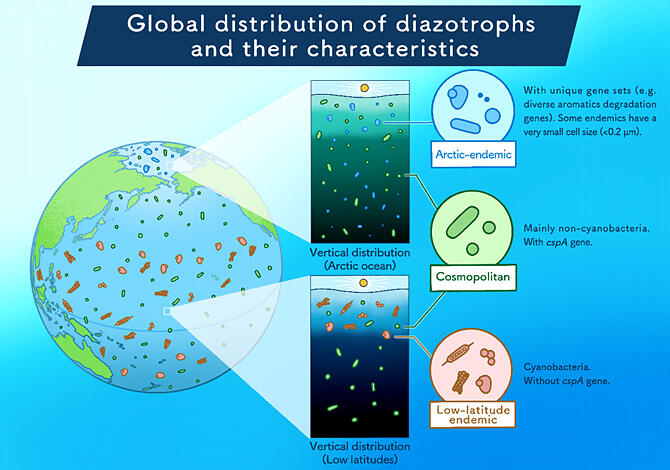A research group led by Associate Professor Takuhei Shiozaki of the Atmosphere and Ocean Research Institute at the University of Tokyo and Project Researcher Yosuke Nishimura at the Japan Agency for Marine-Earth Science and Technology (JAMSTEC) announced that they had successfully sequenced the genomes of diazotrophs using metagenomic data obtained from the Arctic Ocean. The genomes of seven diazotrophs were obtained, which revealed the presence of three types of species in the Arctic Ocean: Arctic-endemic, low-latitude-endemic, and cosmopolitan (globally distributed) species. These findings are expected to contribute to a more comprehensive understanding of nitrogen fixation in the ocean. The findings were published in the 23 May 2023 issue of The ISME Journal.

Provided by the University of Tokyo
Nitrogen compounds, which are scarce on the ocean's surface, are supplied to the marine ecosystem via nitrogen fixation by marine microorganisms. Traditionally, nitrogen fixation was believed to occur only in nutrient-poor regions at low latitudes, primarily in tropical and subtropical marine areas.
From this background, the research group has shown that nitrogen fixation also occurs in the Arctic and Antarctic oceans. The organisms responsible for nitrogen fixation in these regions were expected to have distinct physiological and ecological characteristics because their environments differed significantly from those at lower latitudes. However, the details remained unknown.
In June 2022, Nishimura and his colleagues developed a method to sequence the genomes of individual microorganisms using metagenomic data. Using this method, they sequenced over 50,000 prokaryotic genomes and released them as the world's largest catalog of marine microbial genomes, named 'OceanDNA MAG Catalog.'
In this study, the research group extracted genomes containing nitrogen fixation-related genes from the Arctic Ocean metagenomic data of the Catalog and successfully obtained the genome sequences of seven diazotrophs.
The distribution of these 7 genomes in different marine regions was investigated using a global metagenomic database, and the proportions in which they occurred was determined, and the research group confirmed the existence of cosmopolitan (globally distributed) species other than Arctic-endemic (exclusive to the Arctic Ocean) species. They were able to separate marine diazotrophs into 3 species types, including the known low-latitude-endemic species.
Although Arctic-endemic species do not exhibit significant differences in overall function compared to other diazotrophs, they possess gene sets not found in other diazotrophs of the same class or species. For example, species in the class Gammaproteobacteria possess diverse aromatic compound-degrading genes and numerous glycosyltransferase genes. Additionally, UCYN-A (nitrogen-fixing symbiotic cyanobacterium) possesses a DNA repair gene that is not found in other members of this species. Furthermore, it is speculated that some of these species may have extremely small body sizes.
The cosmopolitan species in the Arctic Ocean are mostly non-photosynthetic organisms that possess cold shock protein genes, such as cspA. Even at lower latitudes, the deep sea is extremely cold (∼2 ℃), suggesting that these cosmopolitan species are adapted to life in the Arctic Ocean. This study also revealed that most nitrogen-fixing cyanobacteria capable of photosynthesis do not possess cold shock protein genes.
Shiozaki stated, "Our genomic analysis showed that some Arctic-endemic species produce substances that allow them to adhere to something, and one candidate is sea ice. Therefore, we are currently investigating diazotrophs that might inhabit sea ice. Sea ice in the Arctic is rapidly diminishing, so identifying their habitats is crucial for future predictions."
Journal Information
Publication: The ISME Journal
Title: Distribution and survival strategies of endemic and cosmopolitan diazotrophs in the Arctic Ocean
DOI: 10.1038/s41396-023-01424-x
This article has been translated by JST with permission from The Science News Ltd. (https://sci-news.co.jp/). Unauthorized reproduction of the article and photographs is prohibited.




